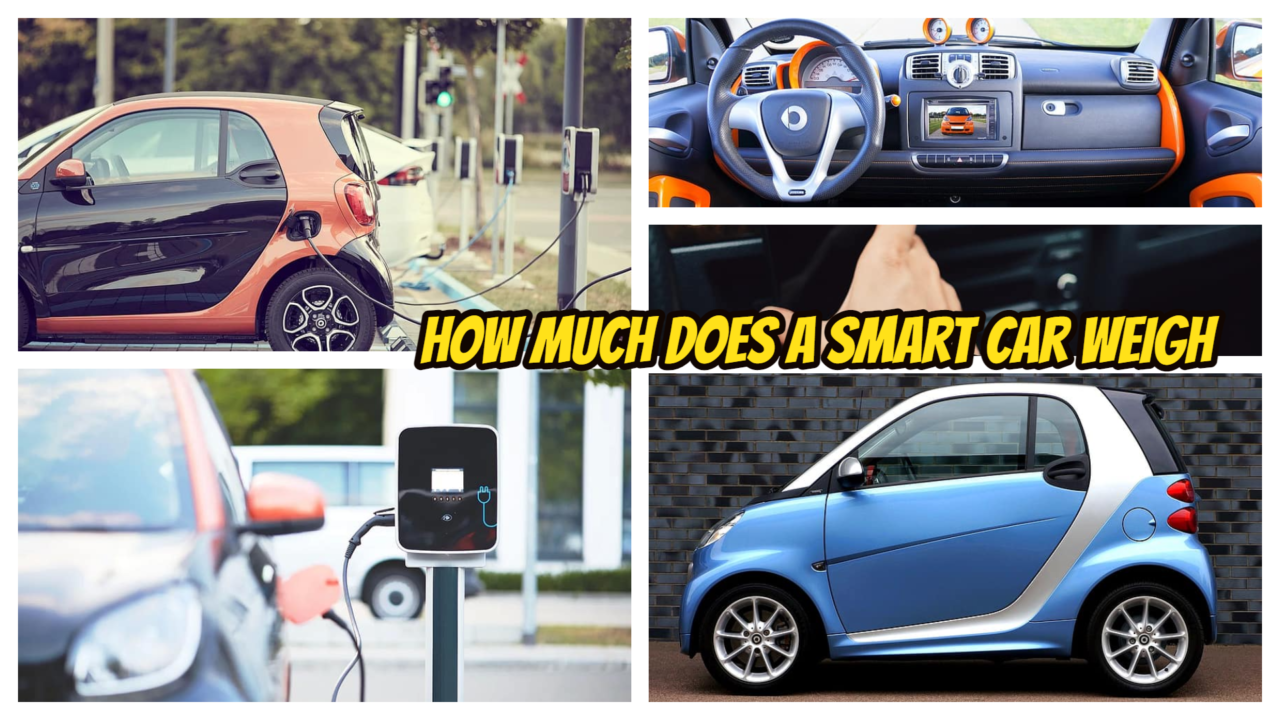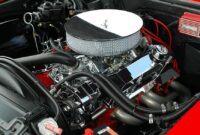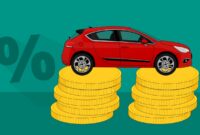How Much Does a Smart Car Weigh – In general, smart cars are like any vehicles that are powered by advanced technologies and tend to focus on efficiency. Much like your smartphones, the term simply means a more powerful model.
The weight of smart cars is one of the primary factors which contribute to its performance. If you are wondering how much does a smart car weigh, read on the following sections to find out the answer.
A smart car is a type of small, compact car that is designed for urban driving and is known for its fuel efficiency and eco-friendly features. Smart cars are produced by the German automaker Daimler AG and were first introduced in 1998. They are typically two-seater or four-seater vehicles with a distinctive, boxy design that maximizes interior space while minimizing exterior dimensions.
Smart cars are often referred to as “micro-cars” or “city cars” because of their compact size and urban-focused features. They are designed to be easy to park, maneuver, and navigate through congested city streets, and are often equipped with features such as automatic transmission, electric power steering, and hill-start assist.
Many smart cars are also available with hybrid or all-electric powertrains, making them a popular choice for eco-conscious drivers. Overall, smart cars are a unique and practical choice for urban drivers who value fuel efficiency, maneuverability, and eco-friendliness.
There are several smart car brands in the market
including:
- Smart – The Smart brand is a subsidiary of Daimler AG and is known for producing compact city cars with eco-friendly features.
- Fiat – The Fiat brand produces a range of small cars, including the Fiat 500, which is a popular choice for city driving.
- MINI – The MINI brand, owned by BMW, produces a range of small cars that are designed for urban driving and are known for their sporty handling and unique styling.
- Toyota – Toyota produces several small car models, including the Yaris, which is a popular choice for city driving.
- Honda – Honda produces several small car models, including the Fit and the Civic, which are known for their fuel efficiency and practicality.
- Hyundai – Hyundai produces several small car models, including the Accent and the Veloster, which are designed for urban driving and offer good value for money.
- Kia – Kia produces several small car models, including the Rio and the Soul, which are known for their practicality and affordability.
These are just a few examples of smart car brands in the market, and there are many other options available depending on your needs and preferences.
smart car weigh
How Much Does a Smart Car Weigh and Why Is It Important
Many might think that gasoline is the only factor that affects the price of a four-wheeled vehicle.
In fact, the weight of the car also has a significant influence.
The weight of a smart car varies depending on the model and the specific features included. However, on average, a smart car typically weighs around 1,800 pounds or 820 kilograms.
The weight of a smart car is crucial for several reasons.
First, it affects the car’s fuel efficiency and performance. A lighter car generally requires less power to accelerate, which can lead to better fuel economy and acceleration times.
Second, a car’s weight can also affect its handling and maneuverability. A lighter car may be more agile and easier to park in tight spaces, while a heavier car may feel more stable at high speeds and in windy conditions. Finally, the weight of a car can also impact its safety in the event of a crash.
A lighter car may be more vulnerable to damage in a collision, while a heavier car may offer more protection to its occupants.
In other words, the heavier the vehicle, the more energy is needed to run it.
A smart car has an average weight of 1,550 pounds.
Still, some models manufactured by different companies are ranging between a few pounds.
smart car weight
Here’s a table outlining some pros and cons of using a smart car
along with an explanation of why these factors are crucial:
| Pros | Cons | Why it’s crucial |
|---|---|---|
| Compact size | Limited seating and storage space | Smart cars are designed to be small and easy to maneuver, making them ideal for urban driving |
| Fuel-efficient | Limited range and power | Fuel efficiency is becoming increasingly important as gas prices rise and emissions regulations become stricter |
| Lower emissions | Limited safety features | Emissions reduction is crucial for reducing air pollution and mitigating climate change |
| Lower operating costs | May not perform well on highways or in inclement weather | Lower operating costs can make car ownership more affordable for budget-conscious drivers |
| Easy to park and maneuver in city | Not suitable for long-distance travel or large families | Maneuverability and parking ease can save time and reduce stress in urban driving |
| Lower maintenance costs | Limited options for customization or personalization | Lower maintenance costs can save money over the lifetime of the vehicle |
In addition to these factors, there are other aspects to consider when it comes to using a smart car. For example, some drivers may appreciate the eco-friendly image associated with smart cars, while others may prefer the convenience of a larger, more powerful vehicle.
It’s also important to consider how a smart car fits into your overall lifestyle and driving needs – for instance, if you frequently travel long distances or transport large items, a smart car may not be the best choice for you.
Ultimately, the choice of whether or not to use a smart car depends on a variety of factors, including personal preferences, driving habits, and budget.
However, as concerns about fuel efficiency, emissions, and urbanization continue to grow, the compact size and eco-friendly features of smart cars are likely to become increasingly crucial considerations for drivers.
The latest model of smart vehicles weighs around 1,850 pounds, based on the available models and the soft top upgrades. Ever wondered why smart car weight is important? Here are the reasons:
Car Stability – How Much Does a Smart Car Weigh
Your safety while driving a car is greatly influenced by the stability of your car weight.
The control and handling of the vehicle may lead to a difficult situation if the weight of your smart car doesn’t have an even weight distribution.
In most of the regular vehicles, the front and back brakes will be off quickly.They may result in a disparity in terms of replacement when the car weight is not evenly distributed.
It means that one of the brakes will be required earlier replacement than the other brake.Once it is replaced with a new one, the other one is aged and won’t be able to stabilize the other one. That is why an even weight distribution in a smart car is exceptionally crucial for the car’s stability.
car stability, smart car, smart car weight
Add More Space for Safety Features
The safety features packed in a smart car is able to keep the driver and passengers safe with only add a little weight. The built-in airbags within the vehicle will not add to much weight to the smart vehicle.
Some might assume smart cars are unsafe due to their lightweight. In fact, they also have passed the same exact crash protection standards that other types of vehicles need to pass as well. In addition, the ideal weight of a smart car will allow more space for protection features.
read also: How Often Should You Service Your Car to Ensure Good Maintenance
In most of the smart car models,
the interior part is made of Tridion steel sheet that provides for safety against collisions up to 70 miles an hour.
The weight of a smart vehicle mainly consists of the motor, as not many other enormous things will fit in the optimal design of the car.
add more space for smart car – Image source: pikist.com
Read more:
- How to Transfer a Car Title to a Family Member with Ease
- How to Sell a Car in Texas – 5 Simple & Easy Steps
- How to Remove Tree Sap from Car In 5 Easy Steps & Safe
- How Long Does It Take to Charge a Car Battery when It is Suddenly Dead
Now, you already know the answer to how much does a smart car weigh. The weight of a smart vehicle has a significant role in the controlling and protection of the car.
If you’re looking for a four-wheeled vehicle that doesn’t cost too much and guarantee your safety, the smart car will be your ideal option.
In conclusion,
the weight of a smart car varies depending on the model and specific features, but on average, it weighs around 1,800 pounds or 820 kilograms. The weight of a smart car is crucial for several reasons, including its impact on fuel efficiency, performance, handling and maneuverability, and safety.
A lighter car generally requires less power to accelerate, which can lead to better fuel economy and acceleration times. A lighter car may also be more agile and easier to park in tight spaces, while a heavier car may feel more stable at high speeds and in windy conditions.
Additionally, the weight of a car can impact its safety in the event of a crash, with heavier cars typically offering more protection to their occupants. Overall, the weight of a smart car is an important consideration when choosing a vehicle, as it can affect everything from fuel efficiency to safety.






